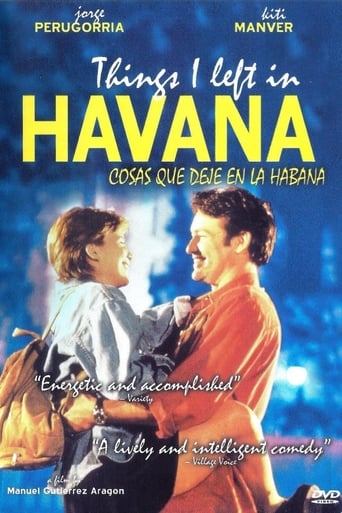Matialth
Good concept, poorly executed.
Majorthebys
Charming and brutal
ChicRawIdol
A brilliant film that helped define a genre
Zlatica
One of the worst ways to make a cult movie is to set out to make a cult movie.
jotix100
Nena, Ludmila, and Rosa, three young women arrive in Madrid from Cuba. They have been sponsored by an aunt who had settled in Spain some years ago, and who now, believes she is more Spaniard than Cuban. At the same time, another couple with a young girl are met at the airport by Igor, a Cuban friend who is now living in Madrid.The three sisters quickly learn that their new home is not exactly what they had in mind when they thought about abandoning their country. They arrive to a society they are not prepared for; they are at a disadvantage because the regime in which they have lived most of their lives hasn't prepared them for anything of practical use in their new country. The aunt proves to be a woman who sees in their nieces a nuisance to her ordered life and she feels they are invading her territory. Maria, the aunt, wanted Nena to take an interest in Javier, a gay Spaniard, who obviously couldn't care less for her, but is willing to enter in an arranged marriage to help him disguise what he really is, sexually.Igor, on the other hand, is a small con artist. Igor also is a man who could be bisexual, as proved by the fact of his encounter with the man who falsifies documents and is asked to cut his toe nails... The newly arrived Cubans feel they don't want to stay in Spain, since their goal is to settle in Miami. Igor falls for Nena, the prettiest of the sisters. At the same time, he is double timing her with Azucena, Maria's best friend and neighbor. Nena who wants to be an actress gets reunited with a fellow Cuban playwright who is staging a show they had done in Cuba, but now, for the Madrid presentation has been transformed into a work that doesn't reflect the original play.Manuel Gutierrez Aragon, the Spanish director, co-wrote the film with Senel Paz, a Cuban writer. The film is laden with clichés that renders it completely false. Nothing makes sense, and we don't believe for one moment what is happening. Everything is phony. It's hard to imagine, a gay man, like Javier will suddenly find happiness in marrying Ludmila, who seeks him out and suddenly performs the magic of turning him into a straight man. Hellooo!! Jorge Perugorria, an actor who could use speech therapy to cure his heavy Havana-accent, is an enigma in the picture. This actor, like Daisy Granados, who plays the aunt Maria, have been lucky in that they have been cast in most of the films made for the Cuban cinema. This actor must be well liked as his other career outside Cuba seems to indicate. Violeta Rodriguez, who plays Nena, is a beautiful woman. Her Nena is a bit also far fetched, but one is willing to compromise. Best of the lot is Isabel Santos, who gives Rosa dignity. Pepon Nieto's Javier doesn't add anything to the film.For fans of Cuban films, remember, this is a Spaniard director's interpretation of a reality that he never knew!
cyn_duncan
Foreign films are so good at combining comedy with drama and creating films that leave us wondering if we should laugh or cry. There are lots of moments in this film that are funny, but overall it's a sobering look at what it feels like to live in exile. The film starts out in Havana so we can understand what the characters are leaving behind. Spain offers more economic opportunities, but none of the Cubans who go there are really happy. They want things they can't have at home - career opportunities, money, a nice house - but they miss the warmth and color of their island. The aunt (Daisy Granados) has tried to become less Cuban and more Spanish, but she's just a bitter and frustrated woman who wants everyone else to be as unhappy as she is. Although she claims she can't stand Cuban food, she sneaks into the kitchen at night and eats it cold out of the pot when no one is looking - what a perfect metaphor for the way she covers up her true identity in order to "fit in" in her new country. Nena (Violeta Rodriguez) and Igor (Jorge Perugorría) have great chemistry and make a great romantic couple. The constant struggle between money vs. love, economic opportunity vs. home is heartbreaking. It makes you realize that most Cubans who leave the island are only leaving because of economic hardships, and that if they had a choice, they're rather not leave.
esteban1747
Cubans go away from their country looking for better standard of life, some go to USA and others go to Europe. The reality is that they were, are and will be Cubans for ever, missing always their motherland. This film is an evidence of homesickness by Cubans. It also shows how the naive emigrants are sometime exploited by even experienced compatriots.
Gonzalo Melendez (gonz30)
This movie, a Cuban-Spanish co-production, was written by a Spaniard who admittedly remembers his mother's nostalgia for Havana of the 50's. The first problem lies there in: the Havana of the 50's is not the Havana of the 90's these ladies just left. How can you romanticize or be nostalgic about America's Beirut? Secondly, the refugees from Havana, and their overly capitalistic (in the worst of contexts) aunt are all Cuban state paid and controlled actors. They appear in most if not all examples of this new 90s genre, the Cuban-European co-production, where Cuba supplies the raw materials (actors, technical support, sets, locations) and the Europeans (WHAT ELSE?)the money and distribution. The Cuban government gets its much needed hard currency this way, and shows a gullible world how conscious Cubans are of their plight and what an open society they live in (STRAWBERRY AND CHOCOLATE, one of the first of this genre is akin to the Chinese depicting their compassion on Tianemen Square).The film stars the omni present Jorge Perugorria (one of Cuba's cash cows),and former Communist propaganda movie star Daisy Granados as the evil, capitalist aunt, as well as the daughter of one of the Cuban regime's signature musicians, the very loyal to the party Silvio Rodriguez. Kind of like an Albanian Kossovar family drama made by Milosevic's handpicked Serb stars. A fantasy, and enjoyable at that if you can understand the irony of it all.

